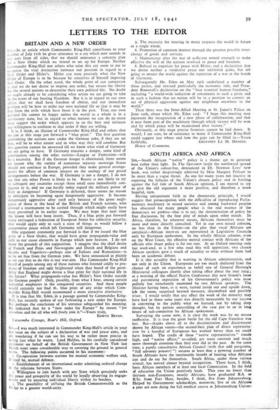was much interested in Commander King-Hall's article in your last
issue on the subject of a declaration of war and peace aims, and am wondering if he can see his way to be rather more precise in saying just what he wants. Lord Halifax, in his carefully considered statement on behalf of the British Government in New York- last March went some considerable way to covering the ground in general terms. The following points occurred in his -statement T. Co-operation between nations for mutual economic welfare and, if need be, mutual defence.
2. Establishment of an international order admitting ordered change in the relations between States.
3. Willingness to join hands with any State which genuinely seeks the peace and prosperity of the world by loyally observing its engage- ments and by ensuring individual liberty within its borders.
4. The possibility of utilising the British Commonwealth as the bridge to a greater world-unity.
5. The necessity for treating in many respects the world in future as a single whole.
6. Promotion of common interest through the greatest possible inter- change of goods and services.
7. Maintenance after the war of sufficient armed strength to make effective the will of the nations resolved to peace and freedom.
8. Refusal to negotiate for peace with Hitler, and a declaration that we desire neither a vindictive peace nor territorial gains, but are going to ensure the world against the repetition of a war at the hands of Germany.
Subsequently Mr. Eden on May 29th underlined a number of these points, and stressed particularly the economic side, and Presi- dent Roosevelt's declaration on the " four essential human freedoms," including " a world-wide reduction of armaments to such a point and in such a fashion that no nation will be in a position to commit an act of physical aggression against any neighbour anywhere in the world."
Then there was the Inter-Allied Meeting at St. James's Palace on June 12th, about which Mr. Eden said: " I hope this meeting may represent the inauguration of a new phase of collaboration, and that it may form part of the machinery through which victory will be won and by which peace will be maintained after victory."
Obviously, at this stage precise frontiers cannot be laid down. It would, I am sure, be of assistance to many if Commander King-Hall could suggest just where and how the gaps can be filled in.—Yours

























 Previous page
Previous page